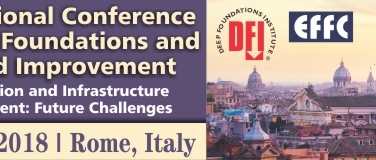
The DFI and EFFC are calling for abstracts to be submitted for its upcoming conference on Deep Foundations and Ground Improvement ‘Urbanisation and Infrastructure Development: Future Challenges’.
The conference will be taking place on 6-8 June 2018 in Rome, Italy. Abstracts can be submitted here.
The conference will explore the challenges of upcoming urban infrastructure megaprojects and learn about modern technologies and techniques to overcome these challenges.
The global trend of migration to urban centres continues to create large demands on urban infrastructure including transit corridors, energy, water and waste management systems. As a result, the construction industry is developing new technologies for equipment, tools, instrumentation and materials used for the installation of deep foundations/excavations and ground treatment/improvement methods. These modern solutions have an important impact on programming and project criteria, modelling, design and structural engineering.
Call for Abstracts
The EFFC and DFI are welcoming presentations on variations in national and international codes (including Eurocode), new investigation methods, Project Management Information System (PMIS) and building information modelling (BIM) implementation. Contractors are invited to discuss case histories that highlight how these procedures impact contractual rules, construction risk, execution procedures, quality control and final acceptance criteria.
Geotechnical equipment and material manufacturers as well as technology providers are invited to present advancements and trends in capabilities, safety, sustainability, and environmental compliance. Young researchers are encouraged to submit for consideration summaries of their PhD and MSc final reports that are related to the conference theme.
International public and private clients are invited to present their upcoming programs for development of new infrastructure. Researchers and designers are warmly invited to contribute and debate design and modelling criteria for new and innovative technologies. Presentations related to
Please submit your abstract to one of the following sessions:
A. Deep Foundation Technologies
• Case histories and Lessons Learned on Deep Foundations Projects in relation to construction, technologies, equipment, materials, and quality control.
• Innovative solutions for new challenges in Deep Foundations.
• Risk analysis in the various stages of design and construction.
B. Design and Modeling Criteria
• Design criteria, modeling and computing for new applications in geotechnical projects.
• Differences in implementation between national and international codes and possible harmonization.
• Strategies for improving the various codes to reflect innovations and advancements in modern technologies, equipment and computer recording systems.
• Geotechnical risk analysis in design.
C. Ground Improvement Technologies
• Case histories and Lessons Learned on Ground Improvement Projects in relation to construction, technologies, equipment, materials, and quality control.
• Innovative solutions for new challenges in Ground Improvement.
• Risk analysis in the various stages of design and construction.
D. Connections between PMIS and BIM (Project Management Information Systems and Building Information Modelling)
• Definition and implementation of the PMIS (Project Management Information System) concept in geotechnical projects.
• Definition and implementation of the BIM (Building Information Modelling) concept in geotechnical projects.
• Synergy between the PMIS and BIM in relation to geotechnical projects.
• Using IMS programs as method to improve project Quality Control, Quality Assurance and final project
Acceptance Criteria
• Remote analysis of the data provided by the IMS programs.
• Application of PMIS for reduction of risk based on a better understanding of data and information before, during and after project construction.
E. Geotechnical Investigation and Testing Requirements
• Improvement in geotechnical site investigation technologies and laboratory testing methods.
• Geotechnical data requirements and interpretation based on new technologies and equipment.
• Risk in relation to quality and scope of geotechnical investigations.
F. Contractual Rules and Construction Risk
• Definition and examples of risk in geotechnical projects and suggested solutions for risk reduction.
• Reduction of Construction and Contractual Risk resulting from the use of the PMIS and BIM.
• Contract procurement methods and in relation to contractual risks.
• Technical specifications and method statements in relation to procurement methods.
• Contractors’ corporate and key personnel: qualifications and experience requirements.
Abstracts for technical papers and panel sessions can be submitted at http://www.dfisubmissions.org/?siteid=dfi-effc2018 no later than Friday, June 16, 2017. All accepted papers will be published in the Conference Proceedings, and select papers will be presented orally by the author during the appropriate technical session.
